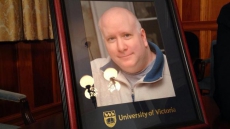TORONTO - Visiting a hospital emergency department often conjures up an image of hours of cooling one's heels before being assessed by a doctor, treated and released.
For most patients, that process takes long enough 7.5 hours or less on average, says a report released Tuesday. But for the 10 per cent of patients who need to be admitted, those waits can be much longer, with one in 10 of those requiring an in-hospital stay waiting in an emergency department more than 28 hours before getting transferred to a bed.
The report by the Canadian Institute for Health Information (CIHI) found seniors are among those with the longest wait times: one-quarter of those aged 65 and older who visit an ER need to be admitted, and one in 10 of them are kept in the emergency department more than 31 hours before getting a bed.
"For seniors, they're more likely to have one or more chronic conditions and other related health issues; they're more likely to need admission when they do go to the emergency department," said Greg Webster, director of acute and ambulatory care information services at CIHI. "So that means that there are more seniors in that admitted category that tends to have the longest emergency department waits."
Chronic conditions such as diabetes, high blood pressure and arthritis are more prevalent among older Canadians and often require hospitalization, he said. But the report also found the leading conditions for which people need admission are respiratory conditions such as chronic obstructive pulmonary disease, or COPD, heart failure and pneumonia, which can require urgent and often complex care.
Reacting to Tuesday's report, Dr. Alan Drummond of the Canadian Association of Emergency Physicians, or CAEP, suggested it's shameful that ER patients who are considered sick enough to need admission "have to spend an inordinate amount of time getting inadequate care in the emergency department."
In a 2013 position statement, CAEP set out a number of targets for admission, including a mean time of two hours for most patients to get transferred to a bed, with a maximum of eight hours for 10 per cent of those needing hospitalization. But as the CIHI report shows, that's far from the reality.
Drummond said patients can spend 12, 24, even 36 hours in the ER waiting to be transferred to a ward or the ICU.
"I can promise you that despite the best efforts of nursing staff to keep people comfortable, we don't do a good job," he said of hospital ERs.
"(Patients) are put in a back hallway, brightly lit. They have no privacy, no toileting facilities. Their basic human needs are unmet, largely because emerg staff are trained to deal with the constant flow of sick people, and so they get poor quality of care, they get inadequate pain management, they get inadequate administration of appropriate drugs.
"They get lousy care. And they suffer."
Drummond, who practises emergency medicine in Perth, Ont., said studies have shown that older patients, especially, who languish on stretchers in the ER can suffer complications due to delayed medical attention. "And we now know and it's very clear that they have a higher death rate," he added.
The CIHI study, using data from the National Ambulatory Care Reporting System, analyzed 10 million ER visits, which represents about 60 per cent of all trips made to hospital emergency departments across the country between April 2013 and March 2014.
The report found waits for admission vary by severity: patients who need an operating room or critical care bed have stays in the ER almost three times shorter than those who need a bed in another ward.
While there has been some improvement in ER wait times in the last few years, research suggests bed-blocking by patients who don't require acute care but can't get into a long-term care facility are leading to backups in hospital emergency departments, said Webster.
"That lack of availability is in part seen to be due to a lack of long-term care beds," he said. "So you have people in in-patient beds who could perhaps be equally well-served and treated in a long-term care bed.
"But because they can't get out to those beds, they're stuck in hospital and then it takes longer for the patients to get out of the emergency department."
Drummond agreed, saying that overcrowding in the emergency department is a reflection of what goes on in the hospital as a whole.
In many hospitals, up to 20 per cent of beds can be occupied by "alternative-level care" patients, who would be better managed in long-term care facilities or in their own homes with community support programs, he said.
"Because those beds are occupied, that means people who come to the emergency department who need to be admitted don't get in, so they occupy stretchers in the emergency department and they also cause backlogs to patients waiting," said Drummond, calling it a domino effect.
"The reality is we need to improve bed capacity, particularly at the time when the population is getting substantially older."





